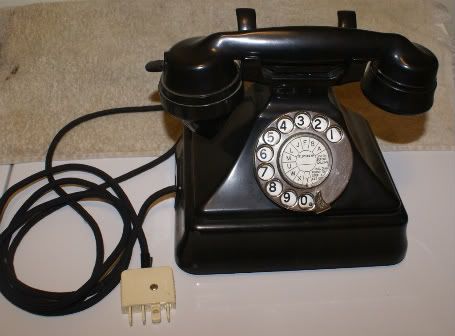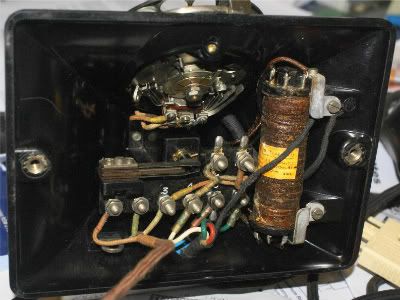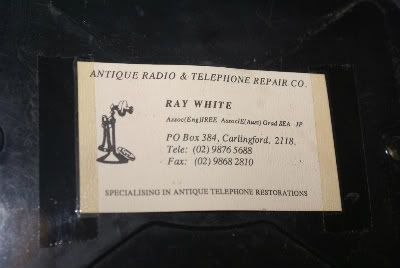Vintage Telephones
Forum home - Go back to Vintage Telephones
|
My rotary dial phone
|
|
|
« Back ·
1 ·
Next »
|
|
|
Return to top of page · Post #: 1 · Written at 6:08:20 PM on 29 August 2011.
|
|
|
|
Location: Sydney, NSW
Member since 28 January 2011 Member #: 823 Postcount: 6935 |
|
Got this today. It doesn't have a brand or date on it externally.  |
|
|
Return to top of page · Post #: 2 · Written at 11:25:20 AM on 31 August 2011.
|
|
|
|
Administrator
Location: Naremburn, NSW
Member since 15 November 2005 Member #: 1 Postcount: 7610 |
|
I think these were the standard British telephone or a copy of it. The dial would be the same as the ones fitted to Australian AWA and STC models. ‾‾‾‾‾‾‾‾‾‾‾‾‾‾‾‾‾‾‾‾‾‾‾‾‾‾‾‾‾‾‾‾‾‾‾‾‾‾‾‾‾‾‾‾‾‾‾‾‾‾‾‾‾‾‾‾‾‾‾‾‾‾‾‾‾‾‾‾ A valve a day keeps the transistor away... |
|
|
Return to top of page · Post #: 3 · Written at 1:47:13 PM on 31 August 2011.
|
|
|
|
Location: Sydney, NSW
Member since 28 January 2011 Member #: 823 Postcount: 6935 |
|
Yes, I believe our 232 was based on the British version 162 and 232, but with modified circuitry and enclosed bell set. |
|
|
Return to top of page · Post #: 4 · Written at 9:37:44 AM on 2 September 2011.
|
|
|
|
Location: Sydney, NSW
Member since 9 July 2011 Member #: 955 Postcount: 36 |
|
Nice looking phone. I've always liked the pyramid style bakelites. They are just that bit classier than the more recent ones. |
|
|
Return to top of page · Post #: 5 · Written at 10:03:51 PM on 2 September 2011.
|
|
|
|
Administrator
Location: Naremburn, NSW
Member since 15 November 2005 Member #: 1 Postcount: 7610 |
|
Certainly more classy than what Telstra offer as the standard phone these days. ‾‾‾‾‾‾‾‾‾‾‾‾‾‾‾‾‾‾‾‾‾‾‾‾‾‾‾‾‾‾‾‾‾‾‾‾‾‾‾‾‾‾‾‾‾‾‾‾‾‾‾‾‾‾‾‾‾‾‾‾‾‾‾‾‾‾‾‾ A valve a day keeps the transistor away... |
|
|
Return to top of page · Post #: 6 · Written at 8:21:06 PM on 7 September 2011.
|
|
|
|
Location: Sydney, NSW
Member since 6 September 2011 Member #: 1001 Postcount: 13 |
|
I have a telephone like that, but yours has been modified to work on the AXE/Pulse system that is in use today. Mine is exactly like yours, but has not been modified in any way, all external cords are individually wrapped in a cloth type insulation and then braided, connecting the telephone body with it's hand piece Rec/Trans and a 36" cord to the original 1pair wall block. The code on the bottom are 25 CB. P.M.G -36, and the hand piece code is G.P.O. C35/234 No.164. |
|
|
Return to top of page · Post #: 7 · Written at 5:10:07 PM on 23 February 2012.
|
|
|
|
Location: Jamieson, VIC
Member since 23 February 2012 Member #: 1095 Postcount: 9 |
|
This is in fact a 100 series APO and GPO issued phone - or a 162 - with the skinny cradle - issued up until 1938 - however in 1936 the 232 was issued - with an updated ATSIC and fat cradle enabling the whole unit to be picked up |
|
|
Return to top of page · Post #: 8 · Written at 6:01:06 PM on 23 February 2012.
|
|
|
|
Location: Sydney, NSW
Member since 28 January 2011 Member #: 823 Postcount: 6935 |
|
Thanks for that info.  ... and I also found this inside:  (and those pics are 400 x 300 in Photobucket so blowed if I know why they appear so large on here?) |
|
|
Return to top of page · Post #: 9 · Written at 6:30:46 PM on 23 February 2012.
|
|
|
|
Administrator
Location: Naremburn, NSW
Member since 15 November 2005 Member #: 1 Postcount: 7610 |
|
Photobucket's pixel override settings quite often don't work correctly. I've overridden it with some extra HTML. ‾‾‾‾‾‾‾‾‾‾‾‾‾‾‾‾‾‾‾‾‾‾‾‾‾‾‾‾‾‾‾‾‾‾‾‾‾‾‾‾‾‾‾‾‾‾‾‾‾‾‾‾‾‾‾‾‾‾‾‾‾‾‾‾‾‾‾‾ A valve a day keeps the transistor away... |
|
|
Return to top of page · Post #: 10 · Written at 6:53:30 PM on 23 February 2012.
|
|
|
|
Location: Sydney, NSW
Member since 28 January 2011 Member #: 823 Postcount: 6935 |
|
I've overridden it with some extra HTML. |
|
|
Return to top of page · Post #: 11 · Written at 9:36:53 PM on 26 April 2012.
|
|
|
|
Location: Canberra, ACT
Member since 24 April 2012 Member #: 1136 Postcount: 175 |
|
GTC, |
|
|
Return to top of page · Post #: 12 · Written at 12:05:49 AM on 27 April 2012.
|
|
|
|
Location: Sydney, NSW
Member since 28 January 2011 Member #: 823 Postcount: 6935 |
|
Thank you for that detailed information. I can't see any code on the base like Oldfella quoted in his post. |
|
|
« Back ·
1 ·
Next »
|
|
|
You need to be a member to post comments on this forum.
|
|

Sign In

Vintage Radio and Television is proudly brought to you by an era where things were built with pride and made to last.
DISCLAIMER: Valve radios and televisions contain voltages that can deliver lethal shocks. You should not attempt to work on a valve radio or other electrical appliances unless you know exactly what you are doing and have gained some experience with electronics and working around high voltages. The owner, administrators and staff of Vintage Radio & Television will accept no liability for any damage, injury or loss of life that comes as a result of your use or mis-use of information on this website. Please read our Safety Warning before using this website.
WARNING: Under no circumstances should you ever apply power to a vintage radio, television or other electrical appliance you have acquired without first having it checked and serviced by an experienced person. Also, at no time should any appliance be connected to an electricity supply if the power cord is damaged. If in doubt, do not apply power.
Shintara - Keepin' It Real · VileSilencer - Maintain The Rage

